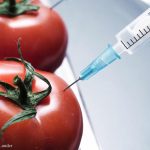A new study published in Science Advances states that the increasing planting of GMO maize and soybean crops has resulted in the increase of herbicide use in the U.S. The study looked at plot-level choices made by U.S. corn and soybean farmers from 1998 to 2011. Pesticides is a broad term that includes herbicides, which kill plants, and insecticides, which kill insects. The herbicide of choice for decades has been glyphosate, one of the components of Roundup. The researchers found that, on average, adopters of GE glyphosate-tolerant (GT) soybeans used 28% more herbicide than nonadopters, while adopters of GE glyphosate-tolerant maize used 1.2% less herbicide. While herbicide use increased, adopters of GE insect-resistant maize used less insecticides. This pattern of change in … [Read more...]
Study Finds GMO Labeling Won’t Cost More
A study conducted for the U.K. Food Standards Agency has found that GMO labeling would increase a family's food costs by 33 cents to $5.58 a year. And a study by Consumers Union reviewed research on GMO labeling and found the annual median cost per person would be $2.30. Food & Water Watch says that Americans deserve to know what is in the food they buy. Groups like the Corn Refiners Association have claimed that Americans will spend more than $1,000 per year on groceries because of the costs associated with adding GMO labeling to products. The CRA study number is so high because they include increases in distribution costs and the costs of switching ingredients in processed foods to organic or non-GMO, even though labeling laws set to go into effect do not have those … [Read more...]
GAO Says USDA Needs to Enhance Oversight of GMO Crops
The U.S. Government Accountability Office has released a report stating that the USDA needs to enhance its oversight and better understand the effects of unintended mixing of GMO (genetically modified organisms, also known as GE, or genetically engineered) crops with other crops. This has long been a concern of those opposed to genetically modified organisms. The report states that the USDA has "not updated its regulations to oversee GE drops derived from alternative technologies in which the GE crop developed contains no plant pest DNA." While the EPA regulates some GE crops as part of its pesticide regulation process, and the FDA works with companies that develop GE crops to consider food safety issues, USDA's GE crop regulations only pertain to crops for which the donor, vector, or … [Read more...]
DARK Act Defeated in Senate
H.R. 1599, ironically labeled the "Safe and Accurate Food Labeling Act of 2015," otherwise known as the "Deny Americans the Right to Know" or DARK Act, was defeated in the U.S. Senate last week as S.R. 2621. Senators did not have enough votes for cloture, and the bill faced bi-partisan opposition. The bill would have preempted states from requiring labeling of foods that contain genetically modified organisms (GMOs). Food companies developed the legislation. The bill would also have continued the voluntary labeling system that lets companies use 1-88 numbers, URLs, QR codes, and social media to tell consumers about the GMOs they use in their products. It would have allowed the USDA to determine what GMO information is provided through the system. And it would have made it harder for … [Read more...]
More Than 700 Chefs Tell Congress to Label GMOs
The Center for Food Safety reports that more than 700 chefs are telling members of Congress to mandate labeling of GMO foods. A petition was delivered on December 2, 2014 to advance legislation called the Genetically Engineered Food Right to Know Act sponsored by Senator Barbara Boxer (D-CA) and Representative Peter DeFazio (D-OR). The petition states, "as chefs, we know that choosing the right ingredients is an absolutely critical part of cooking. But when it comes to whether our ingredients contain genetically modified organisms, we're in the dark. It's time for Congress to move us forward, not backward, when it comes to our right to know what's in our food." The chefs who signed the petition include Art Smith, Tom Colicchio, Danielle Vogel, Andrea Reusing, and José … [Read more...]
Oregon GE Labeling Initiative Heads to a Recount
Measure 92, the genetically engineered (GE) food labeling initiative on the ballot this month is headed for a recount because it is too close to call. The gap between Yes and No is less than one tenth of a percentage point. Andrew Kimbrell, executive director of the Center for Food Safety said in a statement, "thanks to the tireless efforts of on the ground organizer, and despite an aggressive and expensive opposition campaign, GE food labeling is still alive in Oregon. Regardless of what happens next, this is only the beginning. The power and tenaciousness of the Food Movement has been on full display here in Oregon." Monsanto, DuPont Pioneer, Dow AgroSciences, Pepsi, and Coke together donated almost $15,000,000 to defeat the initiative. The previous record for spending on a ballot … [Read more...]
Documents Show Aquabounty’s Management Problems
Food & Water Watch and Center for Food Safety have again asked the FDA to deny AquaBounty Technologies' application for genetically engineered salmon. New evidence from the U.S. Securities and Exchange Commission shows that the company previously handed over responsibility for most safety at its Panamanian facility - including regulatory compliance - to an independent contractor. In 2013, the company handed over management of its facility in Panama to an independent grower who died this summer, leaving the facility in a "precarious state" according to FOod & Water WAtch. Executive Director Wenonah Hauter said in a statement, "at times, even AquaBounty doesn't seem to know what's happening in Panama. The horrendous environmental record of AquaBounty, which includes a security … [Read more...]
Coalition Files Papers in Honolulu Court to Defend GE Initiative
A coalition of Maui and Moloka'i residents, farmers, and advocacy groups, represented by Center for Food Safety and Earthjustice, filed papers Friday in Honolulu federal district court to defend the County of Maui's GMO crop safety initiative. That initiative won in the November elections, despite massive spending by huge corporations opposed to it. A legal challenge was almost immediately filed by those multinational chemical companies. Hawaii is being used an an outdoor lab for companies like Monsanto to test GE and GMO crops and the pesticides used on them. The ballot initiative prohibits the "growth, testing, or cultivation of GE crops in Maui County until an environmental and public health study can show that the planning operations are safe for the community." Nine days after the … [Read more...]
McDonalds Rejects Simplot GMO Potatoes
McDonald's, which is one of the largest fast food chains on the planet, has said they will not use the J.R. Simplot Company's Innate GMO potato, according to Food & Water Watch. Pressure from food safety advocates and the public have forced this move. The Simplot potato has been genetically altered to silence the expression of genes in the plant that produces sugar and asparagine, which together produce acrylamide, a potential carcinogen when the potato is cooked at high heat. Some food safety advocates are concerned that this manipulation will turn off other genes in the plant, since many genes have the identical stretches of DNA. One of the genes that may be turned off naturally protects the potato against pests. Wenonah Hauter, director of Food & Water Watch said in a … [Read more...]
GMO Labeling on the Ballot in OR and CO
Ballot measures requiring all foods containing genetically modified organisms (GMOS) bear labels that say so will be decided by voters in Oregon and Colorado tomorrow. Proponents of these measures say consumers have the right to know which foods contain GMOs so they can make informed purchasing decisions. Critics say state laws regarding GMOs create problems for food manufacturers. In Vermont, which passed the first such law in May, the issue has landed in court. The Grocery Manufacturing Association (GMA), the Snack Foods Association, the International Dairy Foods Association and the National Association of Manufacturers filed suit in June to challenge the law set to go into effect July 1, 2016. “Vermont’s mandatory GMO labeling law – Act 120 – is a costly and misguided measure that … [Read more...]













